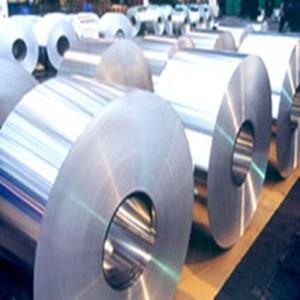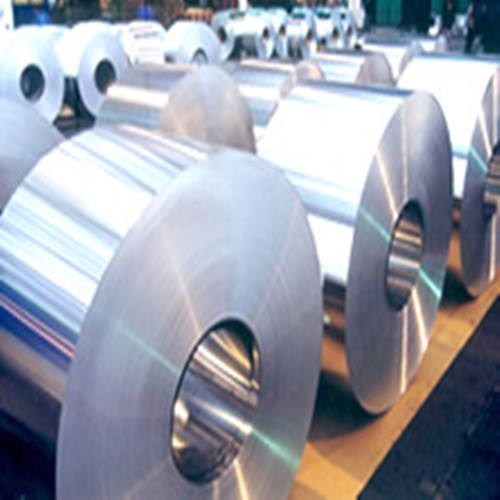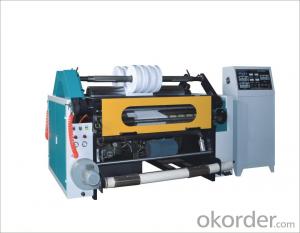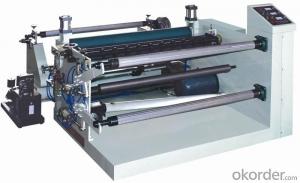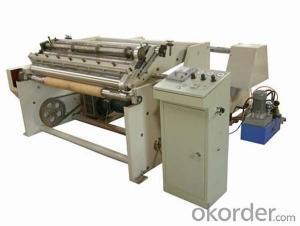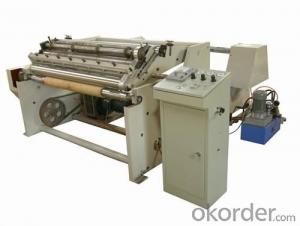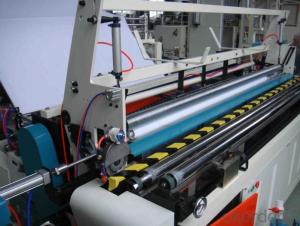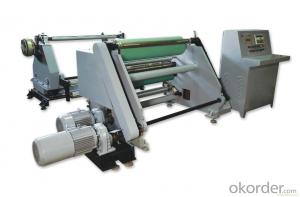Aluminum Coil Slitter Rewinder Machine for Printing Aluminum Products
- Loading Port:
- China Main Port
- Payment Terms:
- TT OR LC
- Min Order Qty:
- -
- Supply Capability:
- -
OKorder Service Pledge
OKorder Financial Service
You Might Also Like
Printing industry left the age of “Stereotype and Branding”, and step into the era of “Photo and Electronics”.Aluminum lithographic support material provides a strong sustaining for this renovation in printing industry.
It will be mostly used in making lithographic support, which is a new type of material among the printing industry for automatic and presswork.
Features:
1.Pre-painted galvanized steel coil is light , beautiful and with good anti-erosion performance.
2.The service life of hot dip galvanized steel plates based color coated steel plates is much longer. As the organic coating covered on the zinc layer has isolation effect, can prevent the steel from rusty better.
3.PPGI can be processed directly, it provides a new raw material for the construction, shipbuilding, vehicle manufacturers, furniture industry.
Applications: Widely applied for construction, home appliance, furniture, transportation and other industries.If you are interested in our products, please do not be hesitate to let us know. We will be happy to give yo a quotation upon receipt of your detailed requirements.
- Q: Why is the aluminum roll upset?
- Mainly in the aluminum slitting process, for various reasons, does not meet the standards and specifications of products, can be used to roll the machine from the new trimming and slitting, winding up to meet customer needs of product specifications
- Q: What are the proper storage methods to maintain the quality of aluminum coil for future use?
- <p>To store aluminum coil for future use, ensure it is kept in a cool, dry place away from direct sunlight and moisture. Stack the coils on flat, level surfaces with appropriate padding to prevent damage. Avoid stacking with other metals to prevent galvanic corrosion. Use clean, dry hands or gloves when handling to prevent oil and dirt from contaminating the surface. Store in a controlled environment with a relative humidity below 65% and a temperature between 32掳F to 90掳F (0掳C to 32掳C). Regularly inspect the coils for any signs of corrosion or damage.</p>
- Q: What are the common surface protection methods for aluminum coils?
- The common surface protection methods for aluminum coils include anodizing, painting, and coating with protective films or laminates.
- Q: Explain how aluminum coils are connected to electronics.
- <p>Aluminum coils play a significant role in the electronics industry due to their high electrical conductivity and low density. They are used in various components such as transformers, inductors, and chokes, where they help in the conversion and regulation of electrical energy. Aluminum's non-magnetic properties make it ideal for parts that need to be shielded from magnetic fields. Additionally, aluminum coils are used in heat sinks to dissipate heat generated by electronic devices, ensuring their efficient operation and longevity.</p>
- Q: Is it possible to utilize aluminum coils in the automotive industry?
- <p>Yes, aluminum coils are widely used in the automotive industry. They are employed in various applications such as engine parts, heat exchangers, and body panels due to their lightweight, corrosion resistance, and high strength-to-weight ratio. Aluminum's recyclability and energy efficiency in production also contribute to its popularity in vehicle manufacturing.</p>
- Q: Are there any specific guidelines for the installation of aluminum coils?
- Yes, there are specific guidelines for the installation of aluminum coils. When installing aluminum coils, it is important to follow manufacturer's instructions and adhere to industry standards. Some specific guidelines for the installation of aluminum coils include: 1. Proper handling: Aluminum coils should be handled with care to prevent damage. It is recommended to use gloves and avoid dropping or dragging the coils during installation. 2. Compatibility: Ensure that the aluminum coils are compatible with the HVAC system you are installing. Consider factors such as coil size, capacity, and refrigerant type. 3. Coil orientation: Pay attention to the correct orientation of the coil during installation. This includes ensuring that the airflow direction matches the system's requirements. 4. Alignment: Proper alignment of the aluminum coil is crucial for efficient operation. Make sure the coil is level and securely attached to the mounting brackets. 5. Condensate drainage: Ensure that the condensate drain pans and lines are properly installed and functioning. This helps in preventing water leakage and potential damage. 6. Electrical connections: Follow electrical guidelines provided by the manufacturer to ensure proper wiring and connections for the aluminum coil. 7. Insulation: Insulate the refrigerant lines and ductwork as required to prevent condensation and improve energy efficiency. 8. Clearances: Maintain adequate clearances around the aluminum coil for proper airflow and service access. This includes ensuring that there is enough space for cleaning and maintenance. 9. Testing: After installation, perform necessary tests and inspections to ensure the aluminum coil is functioning properly. This may include checking for refrigerant leaks, verifying proper airflow, and testing the system's performance. It is important to consult the manufacturer's installation instructions and any applicable building codes or regulations before installing aluminum coils. Following these specific guidelines will help ensure a successful installation and optimal performance of the aluminum coils.
- Q: Its currently 3 AM so i can't check, but my question is:does aluminum rust slower/faster than other metals? I've basically had this bike for about 6 years, but only rid it once. Its been sitting in my backyard under a roof (safe from rain) for 6+ years. Is it safe to ride it? Also, bonus question: Does having a bike on campus make life 10x easier?
- The frame is probably fine, but any bike that sat outside for over 6 years will need a full overhaul and it is likely that many of the steel parts like cables and chain will need to be replaced. Bicycles make local transportation much easier, over distances of less than 5 miles they can be much quicker than a car and far more economical
- Q: Are aluminum coils suitable for high-temperature roofing applications?
- High-temperature roofing applications are not suitable for aluminum coils. Despite being durable and resistant to corrosion, aluminum has a lower melting point compared to commonly used roofing metals like steel or copper. With a melting point of approximately 660 degrees Celsius (1220 degrees Fahrenheit), aluminum cannot withstand the high temperatures experienced on hot roofs during summer or in areas with high ambient temperatures. Consequently, employing aluminum coils for high-temperature roofing applications may cause the material to warp, distort, or even melt due to the excessive heat, resulting in structural damage and potential leaks. It is recommended to opt for materials with higher melting points, such as steel or copper, for roofing projects where high temperatures are a concern.
- Q: What are the common fabrication techniques used for aluminum coils?
- Aluminum coils undergo various fabrication techniques to achieve desired properties. Rolling, annealing, slitting, and coating are commonly employed. Rolling, a primary technique, reduces thickness and shapes aluminum by passing it through rollers. Hot rolling, with high temperatures, makes the metal more malleable, while cold rolling is done at room temperature. Annealing, another important technique, enhances mechanical properties by heating and slowly cooling the aluminum. It relieves stresses, improves formability, and strengthens the metal. Slitting cuts wide coils into narrower strips, providing customization options. Specialized machines are used for precise width adjustments. Coating, a common technique, improves durability, corrosion resistance, and appearance. Paint, anodizing, or powder coating methods create protective layers, preventing oxidation and enhancing weather resistance and aesthetics. These techniques are widely used in the aluminum industry, producing high-quality coils for construction, automotive, aerospace, electrical, and other industries.
- Q: Is it possible to use a saw to cut aluminum coils?
- <p>Yes, aluminum coils can be cut with a saw, but it's important to use the right type of saw. A hacksaw or a fine-toothed metal cutting saw is suitable for cutting aluminum. Lubrication is also crucial to reduce friction and prevent the saw blade from overheating. When cutting aluminum, it's advisable to use a cutting fluid or a light machine oil to keep the blade cool and ensure a clean, smooth cut. Always follow safety precautions and wear appropriate protective gear when cutting metal.</p>
Send your message to us
Aluminum Coil Slitter Rewinder Machine for Printing Aluminum Products
- Loading Port:
- China Main Port
- Payment Terms:
- TT OR LC
- Min Order Qty:
- -
- Supply Capability:
- -
OKorder Service Pledge
OKorder Financial Service
Similar products
Hot products
Hot Searches
Related keywords
